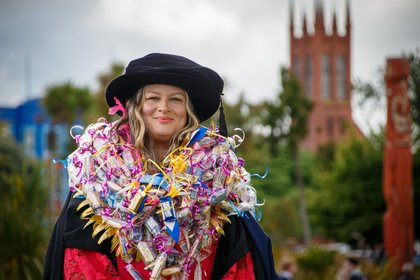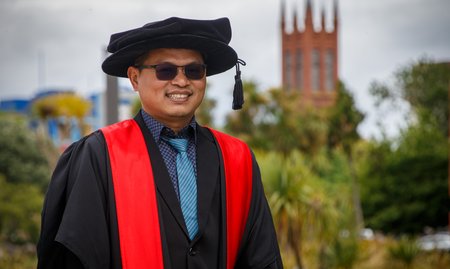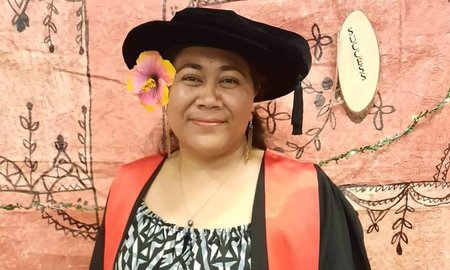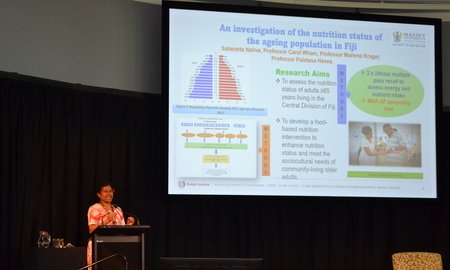
Dr Rochelle Nafatali.
Dr Rochelle Nafatali was born in South Auckland and raised in the Bay of Islands.
She initially studied law, with a plan of working in family and criminal law. She was interested in becoming a judge and having the opportunity to help people avoid jail while addressing the cause of their problems through other sentencing options.
“Half-way through second year law, I decided that intervening earlier in people’s distress, or actually preventing it, would lead to less legal problems and better outcomes, so I decided to concentrate on the psychology pathway.”
Dr Nafatali completed a bachelor’s degree in psychology and Samoan studies and a master’s degree in forensic psychology at Te Herenga Waka Victoria University of Wellington. Following that, she moved to Massey in 2018 after gaining a place in the Doctor of Clinical Psychology programme.
For her doctoral research, Dr Nafatali looked at Pacific understandings of autism, how Pacific families experience autism on a daily basis, Pacific families’ support needs and access, and how language and culture were being maintained within Pacific families raising autistic children.
It’s a subject close to her heart, as Dr Nafatali’s son is autistic.
“He constantly exceeds expectations and is a real blessing. One day maybe he will share his own journey of being a Pacific autistic young person in Aotearoa,” she says.
She hopes that through modelling goal-setting and determination in completing these qualifications, her children will feel confident to fulfil their own dreams.
Dr Nafatali says her research answers the question of how conditions of the mind have come to be so stigmatised within Pacific society, and how that can be changed through advocacy, acceptance of neurodiversity, and educating others. She adds that doing this with alofa (love/compassion) through relationships and existing connections is key.
“The burden of navigating stigma and judgement, often from our own communities, really affected Pacific parents, yet the solutions are also to be found within our communities. Where there was acceptance, understanding, and collective unity, families thrived and all involved were better people for having an autistic family member. They were kinder, less judgemental, more patient, more original, more understanding, more open-minded, better communicators and better parents and teachers.”
Her research also describes the journey of Pacific families from seeking autism assessment through to seeking support, and what these families need. The benefits of traditional culture and language maintenance, even with the communication challenges of autism, are also explored.
Dr Nafatali hopes her research will provide valuable data to decision-makers, as well as lived experiences which are important for health professionals to understand.
She was surprised to discover that she was Massey’s first Pacific Doctor of Clinical Psychology graduate.
“To be the first Massey University Pacific Doctor of Clinical Psychology in 2023 is special for my family, but reflects how psychology has largely failed to reach diverse communities and why few Pacific people consider seeing a psychologist. It is considered inaccessible to many. Research shows that Pacific peoples tend to access clergy, family, friends, and traditional healers when experiencing mental distress, and only consider a psychologist when at crisis point, though this seems to be shifting slowly.
“Our communities and the psychology profession need our authentic Pacific selves and we need many more Pacific psychologists in Aotearoa!”
Dr Nafatali currently works as a clinical psychologist for Ara Poutama Aotearoa Department of Corrections. Since completing her research, she has delivered numerous talanoa, webinars, and presentations across Auckland, Wellington, Christchurch and online, sharing the research findings with the Pacific autism community and health and education professionals.
She says the appetite for the results of her research is huge.
“People want to know how to be more inclusive and accommodating of neurodiversity and how to work effectively with Pacific communities.”
If she could impart one piece of wisdom to aspiring psychologists, it would be “to engage in therapy yourself, know your ‘why’, and bring your whole self to the role; don’t leave your culture or your personality at the door. These are the things that will hold you through the challenging times in becoming and being a psychologist.”
Read more about Dr Nafatali’s research here.
Related news
Defying odds and striving for a brighter future
After growing up in a remote village in Myanmar, Dr Kyan Htoo was the first in his family to graduate from university. Today, he also became the first to obtain a PhD.

PhD journey sets graduate up for career success
Dr Christinah Laalaai-Tausa, the first Pacific person to graduate with a PhD in Politics and International Relations, credits her time at Massey as having a significant impact on her journey into the workforce.

Riddet Institute welcomes first Pacific PhD scholar
Salanieta Naliva, who arrived in Aotearoa New Zealand in July last year, is optimistic her research will have a positive impact on the health of older adults in Fiji.
